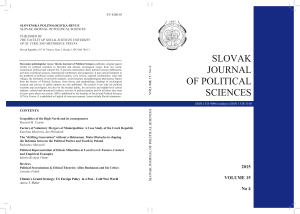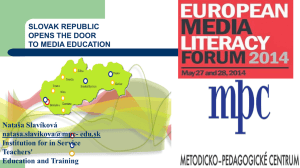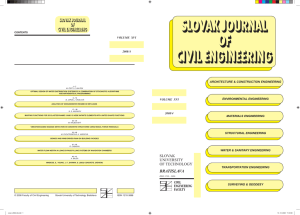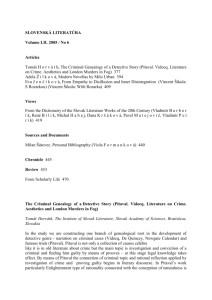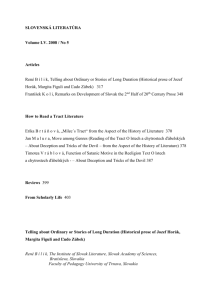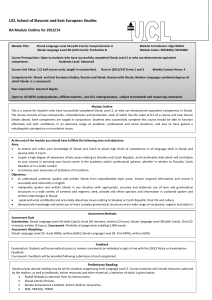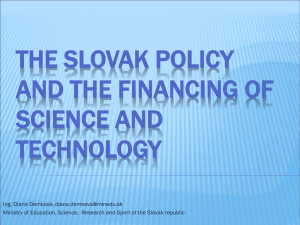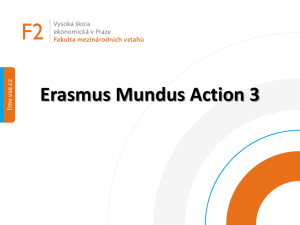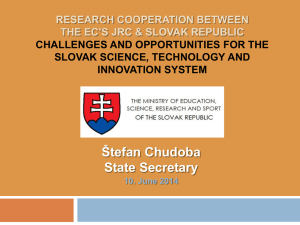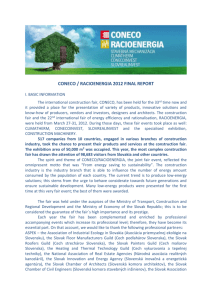slovenská literatúra Volume LIV. 2007 / No 6 Articles Milan Š ú t o v
advertisement
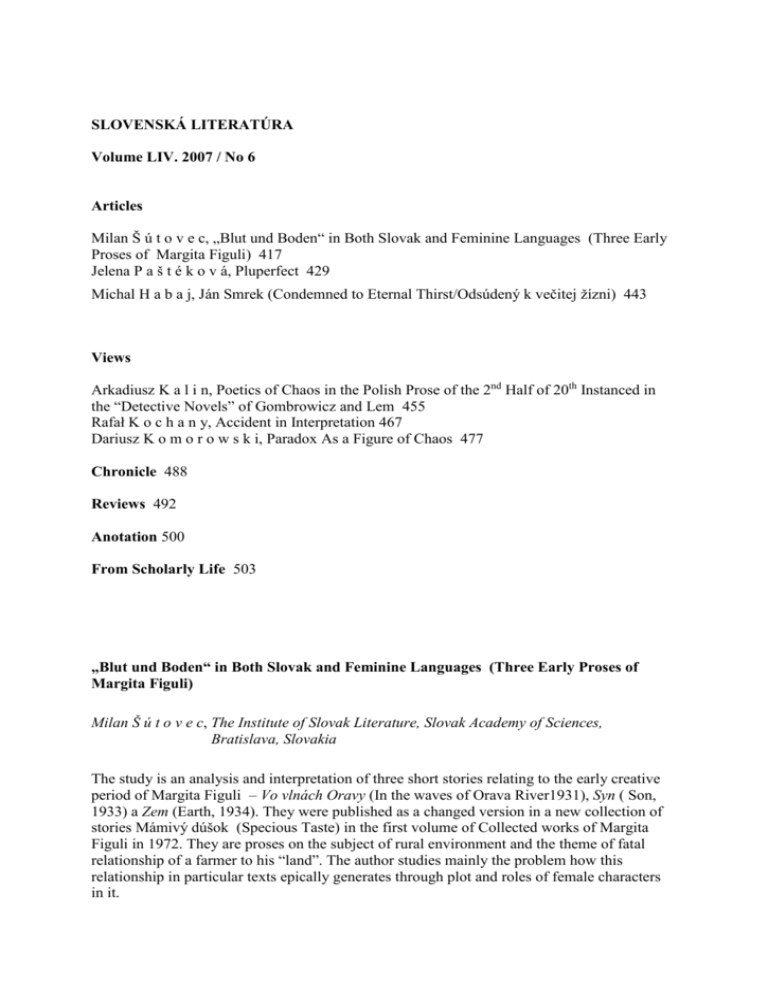
SLOVENSKÁ LITERATÚRA Volume LIV. 2007 / No 6 Articles Milan Š ú t o v e c, „Blut und Boden“ in Both Slovak and Feminine Languages (Three Early Proses of Margita Figuli) 417 Jelena P a š t é k o v á, Pluperfect 429 Michal H a b a j, Ján Smrek (Condemned to Eternal Thirst/Odsúdený k večitej žízni) 443 Views Arkadiusz K a l i n, Poetics of Chaos in the Polish Prose of the 2nd Half of 20th Instanced in the “Detective Novels” of Gombrowicz and Lem 455 Rafał K o c h a n y, Accident in Interpretation 467 Dariusz K o m o r o w s k i, Paradox As a Figure of Chaos 477 Chronicle 488 Reviews 492 Anotation 500 From Scholarly Life 503 „Blut und Boden“ in Both Slovak and Feminine Languages (Three Early Proses of Margita Figuli) Milan Š ú t o v e c, The Institute of Slovak Literature, Slovak Academy of Sciences, Bratislava, Slovakia The study is an analysis and interpretation of three short stories relating to the early creative period of Margita Figuli – Vo vlnách Oravy (In the waves of Orava River1931), Syn ( Son, 1933) a Zem (Earth, 1934). They were published as a changed version in a new collection of stories Mámivý dúšok (Specious Taste) in the first volume of Collected works of Margita Figuli in 1972. They are proses on the subject of rural environment and the theme of fatal relationship of a farmer to his “land”. The author studies mainly the problem how this relationship in particular texts epically generates through plot and roles of female characters in it. In the short stories from 1931 the farmer hero had left his land because of his love to a woman and then he tragically died in the river rafting logs down the river. The analysis shows that conceptually the text is constructed in a way the balladic end manifested direct epic and semantic consequence of relational rupture to the tradition toward “land”. Psychologically more complicated short story from 1933 bears as a theme instinct of keeping family and administration of property as moving power influencing the acting of a main hero instinctively and ramblingly manifested as a natural unlimited power – unlimited in a sense of social as well as ethic limits. In the short story from 1934 a fatal bondage to his land dominates love of a farmer to woman and the love of woman is dominated by the same bondage, too. The author shows that M. Figuli had been building up paradigmatic foundations of her works from her “classical period” of writing earlier, in her creative early beginnings. Pluperfect Jelena P a š t é k o v á, The Institute of Slovak Literature, Slovak Academy of Sciences, Bratislava, Slovakia The aim of the study is to outline stratification of transformations after the ruptures of constitutional law in 1918 and 1948 and in the formative process of new national and cultural identity in the 20th century. We studied it on the materials of literary texts. Historical research of Ľubomír Lipták, cultural studies of Ansgara Nünning and Renate Lachmann concerning national imagology – construction of the picture of oneself - served as methodological background of the article. The changes in the literary figurativeness that indicates relationship to oneself and relationship with the others, auto and hetero-imagines comprehended in the historical crosscut as differentiation remembering value of authentic course of self-identification processes. The first stratum of perception the ruptures of constitutional law are ideologemes. Memoirs of the WWI written by writers Ján Hrušovský and Janko Jesenský represent two variants of approaches toward reality. Hrušovský´s text Zo svetovej vojny (From the WW, 1919) is an event record from “below”, from the position of an ordinary soldier in the front in Austria, later in Halíč. He reflects his condition in the sense of horror, absurdity of a moment, and soul and flesh bifurcation. These motives appeared in the Expressionistic novels Muž s protézou (A Man with a Replacement, 1925) a Peter Pavel na prahu Nového Sveta (Peter and Pavel on the edge of New World, 1930). Memories of Janko Jesenský´s Cestou k slobode (A Way to Freedom, 1933) are written from the position of “redeemer”, a member of foreign resistance, a soldier of Czechoslovak Leggie in Russia who realizes with full responsibility his involvement in formation process of the new republic and he comments contradicted tendencies related to it. There is an agreement between Hrušovský and Jesenský in characteristic of the Slovak national character although in the literary solution they accented different poles of way to national independence: in case of Hrušovský it is individual self-identification and in case of Jesenský it is self-identification of the collective. The contribution of the study is the focus on another layer of reception of the WWI in Slovak literature after 1948. The author observes editorial praxis and evidence of the history of literature (absence) of the former memoirs (noetic vanishing point), and late concurrence in late impulses of Modernism in the 60- tieth of the 20th century (poetics). Ján Smrek (Condemned to Eternal Thirst/Odsúdený k večitej žízni) Michal H a b a j, The Institute of Slovak Literature, Slovak Academy of Sciences, Bratislava, Slovakia The aim of the study is to determine a specific place of Jan Smrek´s debut in the context of his poetry and to point out its organic connection with the following collections of poems, although typologically and aesthetically different from the first one book. With regard to Smrek ´s poetry as a whole I interpret religious and Biblical residua of decadently symbolic provenience in his debut in connection with philosophy of vitalism and Henri Bergson´s idea of “creative development”. The collection of poems Odsúdený k večitej žízni (Condemned to Eternal Thirst, 1922) used to be overlooked and excluded from complex reflection just because of its religiously symbolic character that was aesthetically and noeticly much different from the following Smrek´s “sunny books”. I can identify three basic semantic gestures and author’s stylisations in connections with three cycles of the debut: mystically erotic gesture in Čaša opojnosti (The Bowl of Potency), gesture of suffering in Básnik bolestí (The Poet of Sorrow) and redeeming gesture in the cycle Dnes milujem svoj deň (Today I Love My Day). I find a gradual transformation from “mystic” life to “social” life, conversion from introverted to extroverted attitude, transformation from religious complex of motives to the complex of profanely – intimate motives. The symbolism of night is replaced by symbolism of day. The development from passivity to activity and from eternity of “mystical nights” to common “speedy days” is influenced by Biblically coded sign of “resurrection”. But in the end of the book it is replaced by civil assignment in the space and time. Conflict between asceticism and vitality is resolved for sake the latter one. In the study I try to analyse Smrek´s poetic model of the world overlapping aesthetic categories to anthropologically ontological. In connection with Bergson´s philosophy of “creative development” I interpret Smrek ´s poetic works represented by his book Odsúdený k večitej žízni (Condemned to Eternal Thirst) as process of creation and integration human personality. The core of Smrek´s poetic gesture I can find in a “creator’s “ vision of a man – in calling to ongoing making of oneself and the world.

